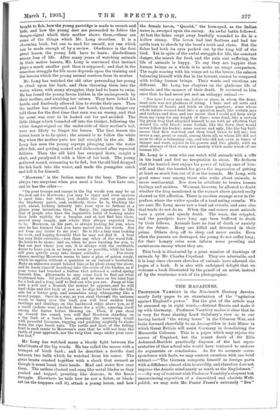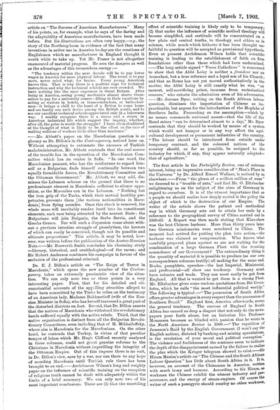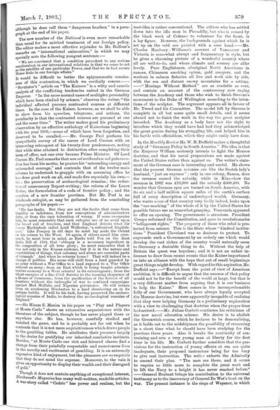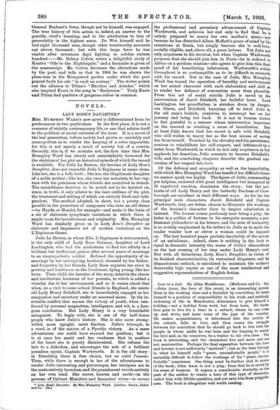THE MAGAZINES.
PROFESSOR VAMBERY in the Nineteenth Century devotes nearly forty pages to an examination of the "agitation against England's power." But the gist of the article may be summed up in eight words,—distrust Russia and make it up with Germany. Professor Vambery makes it clear that he is very far from sharing Lord Salisbury's view as to our having backed "the wrong horse" in the Crimean War, and looks forward cheerfully to an Armageddon in Asia Minor in which Great Britain will assist Germany in demolishing the Muscovite Colossus. This is a paper which may rejoice the manes of Urquhart, but the recent death of Sir Ellis Ashmead-Bartlett practically disposes of the last repre- sentative of that school who would have ventured to endorse its arguments or conclusions. As for its accurate corre- spondence with facts, we may content ourselves with one brief extract :—" The German comports himself in foreign parta with a diffidence almost akin to servility, and therefore does not impress the Asiatic mind nearly as much as the Englishman." —By way of contrast with Professor Vambery's eloquent but unconvincing exposition of a discredited and obsolete Welt- politik, we may note Mr. Foster Fraser's extremely "live." article on "The Success of *American Manufacturers." Many of his points, as, for example, what he says of the daring and
the adaptability of American manufacturers, have been made before. But his illustrations are often very happy,—e.g., the story of the Northrop loom in evidence of the fact that many inventions in active use in America to-day are the creations of Englishmen which no manufacturer in England thought it worth while to take up. Yet Mr. Fraser is not altogether enamoured of material progress. He sees the dangers as well as the advantages of this tremendous energy :—
"The tendency within the next decade will be to pay lower wages in America for mere physical labour. The trend is to pay more, never mind what, for brains. Every young American knows this. That is why there is a positive rage for technical instruction and why the technical schools are ever crowded. We have nothing like the same eagerness in Great Britain. After being in America, seeing young mechanics almost starve them- selves to pay for a university course—filling in their vacations by acting as waiters in hotels, or tram-conductors, or bath-chair men—it brings a chill to the heart of a Briton to come home and see hardly any such desire among the British youth, and to see our excellent technical schools appreciated only in a lukewarm way. I readily recognise there is a stress and a strain in American industrial life which suggest the inquiry, whether, after all, the prize is worth the struggle ? I have often shuddered at the thought of what is likely to be the effect on the race of making millions of workers little other than machines."
—Mr. Abbott's paper on the Macedonian question is as gloomy as Dr. Dillon's in the Contemporary, noticed later on. Without attempting to extenuate the excesses of Turkish maladministration, Mr. Abbott contends that the real source of the trouble lies in the operation of the Macedonian Com- mittee which has its centre in Sofia. "In one word, the Macedonian peasant, who has the misfortune to regard him- self as a Bulgarian, finds himself continually between two equally formidable forces, the Revolutionary Committee and
the Ottoman Government." Mr. Abbott, we may add, dis- misses the Lebanon scheme on the ground that there is no
predominant element in Macedonia sufficient to silence oppo- sition, as the Maronites can in the Lebanon. "Nothing but the iron grip of the Turks, which their mutual hostility per- petuates, prevents them [the various nationalities in Mace- donia] from flying asunder. Once this check is removed, the whole mass will inevitably resolve itself into its constituent elements, each race being attracted by the nearest State : the Bulgarians will join Bulgaria, the Serbs Servia, and the Greeks Greece. Nor will such a dispersion come about with- out a previous intestine struggle of proselytism, the horrors of which can easily be conceived, though not its possible and
ultimate proportions." This article, it may be noted, how- ever, was written before the publication of the Austro-Russian Note.—Mr. Bosworth Smith concludes his charming study —literary, historical, and ornithological—of the raven ; and Sir Robert Anderson continues his campaign in favour of the seclusion of the professional criminal.
Dr. E. J. Dillon's article on "The Reign of Terror in Macedonia," which opens the new number of the Contem- porary, takes an extremely pessimistic view of the situa- tion. We can only note two or three points in a very interesting paper. First, that for his detailed and cir- cumstantial accounts of the appalling atrocities alleged to have been committed by the Turks he relies on the testimony of an American lady, Madame Bakhmetieff (wife of the Rus- sian Minister in Sofia), who has herself traversed a great part of
the disturbed districts on foot. Second, that Dr. Dillon asserts that the natives of Macedonia who withstood the revolutionary bands suffered equally with the active rebels. Third, that the native organisation is distinct from all the Bulgarian Revolu- tionary Committees, even including that of M. Mikhailoffsky, whose aim is Macedonia for the Macedonians. On the other hand, he contends that Turkey, in virtue of that peculiar temper of Islam which Mr. Hugh Clifford recently analysed
in these columns, could not grant genuine reforms to the Christians in Macedonia without imperilling the integrity of the Ottoman Empire. Out of this impasse there is no exit, in Dr. Dillon's view, save by a war, nor can there be any hope of mending Macedonia until Turkish rule there has been
brought to an end.—Archdeacon Wilson's long and weighty paper on the influence of seientific training on the reception of religious truth cannot be dealt with adequately within the limits of a brief summary. We can only note two of his moat important conclusions. These are (1) that the unsettling
effect of scientific training is likely only to be temporary; (2) that under the influence of scientific method theology will
become simplified, and certitude will be concentrated on a few plain and central truths, in• theology and ethics as in science, while much which hitherto it has been thought un-
faithful to question will be accepted as provisional hypothesis. Even at present Archdeacon Wilson holds that scientific training is leading to the establishment of faith on firm foundations other than those which had been undermined, —The long article signed " Voces Catholicae " is concerned to show that the Abbe Loisy is neither a frondeur nor an iconoclast, but a true reformer and a loyal son of his Church; and that as Rome has not yet moved authoritatively in the matter, the Abbe Loisy is still exactly what he was, "an earnest, self-sacrificing priest, immune from ecclesiastical censure," who extorts the admiration even of his adversaries.
Mr. Jerome Dyer, writing on the South African labour question, dismisses the importation of Chinese as im- practicable, but argues for the introductian of the Moplahs of Southern India. Proceeding on the assumption—which by no means commands universal assent—that the life of the Rand mines "can be determined almost to a day," Mr. Dyer contends that they should be worked by means of a system which would not hamper or in any way affect the agri- cultural development or permanent industries of the country. "The labour should be introduced from outside under temporary contract, and the coloured natives of the country should, as far as possible, be assigned to the industry for which, if any, they appear naturally adapted—. that of agriculture."
The first article in the Fortnightly Review, one of extreme interest., being an impressive consideration of "Man's Place in the Universe" by Dr. Alfred Russel Wallace, is noticed by us elsewhere.—From "the gleam of a million million of suns" we descend to a "trouble of ants," and find Mr. 0. Eltzbacher enlightening us on the subject of the aims of Germany in regard to ourselves. It is of the utmost importance that as a people we should realise bow deeply seated is the policy the object of which is the destruction of our Empire. The writer of the article shows the patient and methodical way in which Germany sets out to attain her ends by a reference to the geographical survey of China carried out in 1860-63. A Report was then made stating that Kiao-chow was the best Chinese harbour. More than thirty years later two German missionaries were murdered in China. The moment had arrived for putting the plan into action,—the harbour was claimed as compensation. Who knows what carefully prepared plans against us are not waiting for the combination of a large German Fleet with the trusting somnolence of our Government? The extraordinary thing is the quantity of material it is possible to produce (as our own correspondence columns testify) all making for the same end. Books, pamphlets, speeches—the last Imperial, Ministerial, and professorial—all show one tendency. Germany must have colonies and trade. They can most easily be got from England. All that is wanted to get them is a strong Fleet. Mr. Eltzbacher gives some curious quotations from Die Grenz- boten, which he calls "the most influential political weekly." The following is typical :—" The possession of South Africa offers greater advantages in every respect than the possession of Southern Brazil." England first, America afterwards, seems the general tendency. The success of England in South Africa has caused so deep a disgust that not only do the news- papers pour forth abuse, but an historian like Professor Mommsen becomes so blinded with passion that he wrote in the North American Review in 1900 :—" The repetition of Jameson's Raid by the English Government (I won't say the English nation), dictated by banking and mining speculations,: is the revelation of your moral and political corruption. The violence and foolishness of the sentence seem to indicate the depth of the disappointment caused by the failure to realise the plan which the Kruger telegram showed to exist._—Sir Hiram Maxim's article on "The Chinese and the South African Labour Question" has little about South Africa in it. It is, however, an account of the Chinaman in America, written with much irony and humour. According to Sir Hiram, as workmen the Chinese exhibit the utmost industry and per- severance, and the energy of steam-engines. Of course the writer of such a panegyric should employ no other workmen, although he does call them "dangerous heathen" in a para- graph at the end of his paper. The new number of the National is even more remarkable than usual for its spirited treatment of our foreign policy. The editor makes a most effective rejoinder to Mr. Balfour's remarks on "international animosities," in which we may specially note the following pungent sentence :— " We are convinced that a condition precedent to any serious amelioration in our international relations is that we cease to act ag the satellite of one particular Power, and that we in fact secure Home Rule in our foreign affairs."
It would be difficult to better the epigrammatic concise- ness of this contention, in which we cordially concur.— " Scrutator's " article on "The Kaisers " is a witty and caustic analysis of the conflicting tendencies united in the German Emperor. "In the more normal cases of multiplex personality which have been studied by science," observes the writer, "the individual affected pursues contrasted courses at different times. In the case of the Kaiser, however, as we shall be able to show from his speeches, telegrams, and actions, the peculiarity is that the contrasted courses are pursued at one and the same time." The writer makes good his preliminary observation by an effective anthology of Kaiseriana beginning with the year 1896,—some of which have been forgotten, and deserved to be recalled.—Mr. George Peel prefaces his sympathetic survey of the career of Lord Curzon with an interesting retrospect of his twenty-four predecessors, noting that while nine attained to distinction after completing their term of office, not one ever became Prime Minister. Of Lord Curzon Mr. Peel remarks that non est seribendum sed gubernan- dum has been his motto; he praises his "astounding energy and unbounded courage," and contends that of the twelve main reforms he undertook to grapple with on assuming office he has done good work on all, and made five especially his own,— viz : the preservation of archaeological remains ; the reduc- tion of unnecessary Report-writing; the reform of the Leave Rules; the formulation of a code of frontier policy ; and the creation of a new frontier province. But Mr. Peel is no wholesale eulogist, as may be gathered from the concluding paragraphs of his paper :— " He has faults. But they are not the faults that come from timidity or indolence, from low conceptions of administrative duty, or from the easy toleration of wrong. If some overpraise him, he must remember that such eulogies are of no avail upon the broad soil of freedom, and that England detests what Sir James Mackintosh called Lord Wellesley, 'a sultanised English- man.' Like Pompey in old days he must lay aside the Orient on his return to the West. Or again, if others assail him over- much, he must bear in mind, as Burke told Fox on the East India Bill of 1783, that 'obloquy is a necessary ingredient in the composition of all true glory ; he must remember that it was not only in the Roman customs, but it is in the nature and constitution of things, that calumny and abuse are essential parts of triumph.' And when he returns home ? That will indeed be a change of politics. His scene will shift from a land guarded by an army without a War Office to a land exposed to a War Office without an army; from an East which is being taught adminis- trative economy to a West oriental in its extravagance; from the silent energies of a fine Civil Service to the teeming eloquence of a House of Commons ; from the pacification of the fiercest of all frontiers without the imbroglio of war to confused campaigns against Mad Mullahs and Nigerian potentates. He will return from an awakening Hindustan to a land slumbering on in its antique habits. It will be his task, having preserved the archa3o- logical remains of India, to destroy the archaeological remains of England."
—Sir Hiram S. Maxim in his paper on "Play and Players at Monte Carlo" shows an exhaustive acquaintance with the literature of the subject, though he has never played there or anywhere else. He has, however, carefully studied and watched the game, and he is probably not far out when he contends that it is not mere acquisitiveness which draws people to the gambling tables. He attributes their presence largely to the desire for gratifying our inherited combative instincts. Besides, "at Monte Carlo our rich and leisured classes find a change from their painfully respectable and monotonous lives in the novelty and excitement of gambling. It is an extremely expensive kind of enjoyment, but the pleasures are so exquisite that they do not mind the expense. Moreover, to the vain it gives an opportunity to display their wealth and their disregard of gold."
Though it does not contain anything of exceptional interest, Blackwood's Magazine has many well-written, readable articles. A. war-story called "Cedric" has power and realism, but the root-idea is rather conventional. The athlete who has settled down into the idle man in Piccadilly, but who is roused by the black week of Colenso to volunteer for the front, is a lay figure. However, the backgrounds against which he is set up on the veld are painted with a sure hand.—Mr. Charles Hanbury. - Williams's account of Vancouver and Victoria is somewhat abrupt and fragmentary in style, but he gives a charming picture of a wonderful country where all are well-to-do, and where climate and scenery are alike lovely. Pure Englishmen, aboriginal North Americans in canoes, Chinamen smoking opium, gold assayers, and the workers in salmon fisheries all live and work side by side, with the sea and distant snowy mountains for a setting. —" Musings Without Method" are as readable as ever, and contain an account of the controversy now raging between the Academy and those who wish to finish Stevens's monument to the Duke of Wellington according to the inten- tions of the sculptor. The argument appears all in favour of Mr. Tweed and his Committee. The model left by Stevens is complete in all but some quite small details, and it seems absurd not to finish the work in the way the great sculptor intended. The Academy as a body have not the right to interfere which they would have had had they acknowledged the great genius during his struggling life, and helped him in his battle with officialdom, which they might easily have done.
In the Monthly Review Mr. W. B. Duffield makes a thoughtful study of "Germany Policy in South America." His idea is that the Emperor William seriously intends to fight the Monroe doctrine, and that his naval preparations are made against the United States rather than against us. The writer's state- ment of the German case is interesting and useful. He shows that the present German colonies are like the Scotch lady's husband, "just an expense " ; only in one colony, Samoa, does the revenue exceed the subsidy, while in Kiao-chow the revenue in 1902 was 218,000 and the subsidy £608,400. No wonder that German eyes are turned on South America, with its six and a half million square miles of the earth's surface full of every description of undeveloped wealth. Germany, who wants some of that country very badly indeed, looks upon the " ear-marking " of the whole of it by the United States for possible future use as somewhat grasping. Venezuela appeared to offer an opening. The government is atrocious. President Crespo reformed the Constitution, and gave to revolutionaries "belligerent rights." The property of those who rebel is pro- tected from seizure. This is the State whose "kindred institu- tions" President Cleveland was so desirous to protect. To supersede such a Government by an orderly one which would develop the vast riches of the country would naturally seem to Germany a desirable thing to do. Without the help of Britain the quest was hopeless ; and it is not an unfair in- ference to draw from recent events that the Kaiser importuned us into an alliance with the hope that out of small beginnings great things might develop. With regard to this aspiration Mr. Duffield says :—" Except from the point of view of American ambition, it is difficult to argue that the success of that policy would not be for the benefit of the world at large, but that is a very different matter from arguing that it is our business to help the Kaiser." Here comes in the incomprehensible folly of our Government, who have always loyally accepted the Monroe doctrine, but were apparently incapable of realising that they were helping Germany in a preliminary exploration with a view to challenging that doctrine when the proper time had arrived.—Mr. Julian Corbett continues his criticisms of the new naval education scheme. His desire is to abolish the Greenwich course, which he declares to be demoralising, as it holds out to the midshipman the possibility of cramming in a short time what he should have been studying for the previous three years. Also it breaks the continuity of sea.. training and sets a very young man at liberty for the first time in his life. Mr. Corbett further considers that the pro- visions for the instruction of young officers at sea are quite inadequate, their proposed instructors being far too busy to give real instruction. The writer exhorts the Admiralty to amend their plan. "The men are there, and it seems to require so little more to complete the great work and to lift the Navy to a height it has never reached before." —General Brabant brings his contribution to the universal testimony as to the inaccuracy of General De Wet's book on the war. The present instance is the siege of Wepener, in which
General Brabant's force, though not he himself, was engaged. The true history of this action is, indeed, an answer to the guerilla chief's boasting, and to the attribution to him of generalship in the highest sense. De Wet himself said he had eight thousand men, though other trustworthy accounts say eleven thousand ; but with this large force he was unable after seventeen days' fighting to subdue sixteen hundred.—Mr. Sidney Colvin writes a delightful study of Keats's "Ode to the Nightingale," and a facsimile is given of the manuscript Mr. Colvin discusses the alterations made by the poet, and tells us that in 1884 he was shown the plum-tree in the Hampstead garden under which the poet poured forth his ode "in such an ecstasy." The writer points out the allusion to Titian's "Bacchus and Ariadne " which also inspired Keats in the song in "Endymion." Truly Keats and Titian had qualities of gorgeous colour in common.













































 Previous page
Previous page